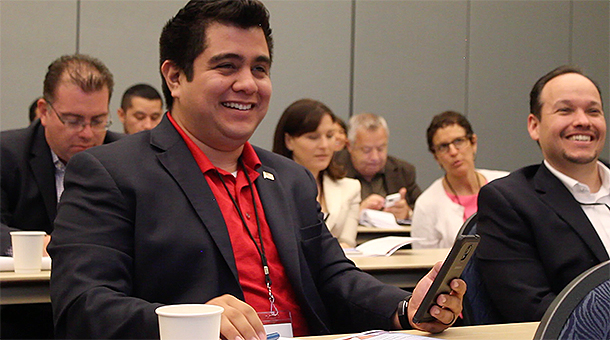
Cudahy city councilmember Cristian Markovich at the Southern California Latino Policy Center Summer 2015 Policy Forum held at Cal State Los Angeles (Photo Credit: John Guenther)
Millennials often get a bad rap as being either disinterested in government or dreamers who don’t understand the realities of politics. Cudahy city councilmember Cristian Markovich, is neither. Growing up, the 30-year-old Markovich was steeped in politics. “I ate my Cheerios while watching Crossfire” and other political shows, he said. Always civically-minded, he launched both a newspaper and a club while still in high school to engage his peers and share his insights.
Like most of his city council colleagues, he grew up in Cudahy in Southern California and left home to pursue a college education, returning to a town operated with very little transparency and a great deal of distrust for the local government. He knew things could be different but he didn’t step into politics right away.
In 2012, shortly after his return, the small town of Cudahy confronted an FBI bribery investigation that resulted in the arrest of two city council members and a government employee.
“We joke that the scandal was probably the best thing to happen to Cudahy,” said Markovich.
The two vacant seats were filled by millennials Chris Garcia and Baru Sanchez, college-educated young men who saw the scandal as an opportunity to step in and make things right. Though Markovich was appointed to the council in 2013, selected from a field of 10 applicants, he was re-elected earlier this year to continue his work.
The majority of council members are now from the millennial generation and the city “is looking a little cleaner and safer,” Markovich said. He and his fellow council members are working hard to make the council more accessible and transparent.
“Before, you had no way of knowing what was going on,” with budgets or city plans, he explained. Now, with a more holistic approach, the city council has long-term plans to improve parks and streets and bring business to the small town. “If we expect businesses to come and families to stay, we must invest in the city,” said Markovich.
In addition to their dreams for a safer and more prosperous city, the millennial influence is apparent in the city council’s new digital commitment to keeping their constituents informed. Striving to be completely available and responsive, they regularly post to social media and engage online with constituents about everything from the grand opening of city parks to job openings to the scheduling of city council meetings.
The previous administration lacked record keeping, failed to build effective systems and provided poor or no communication to constituents.
The city council has not only launched a quarterly magazine to keep citizens up to date on plans and progress, they use all the digital tools at their disposal from Twitter to Facebook to text messages to create an atmosphere of transparency and accountability.
In many ways, this millennial revolution is creating a foundation for the local government as it moves into the future. Though the going has been slow, they seem to be determined to make their home town a place they can be proud of.
“If you put your mind to it, you can accomplish anything,” said Markovich.

